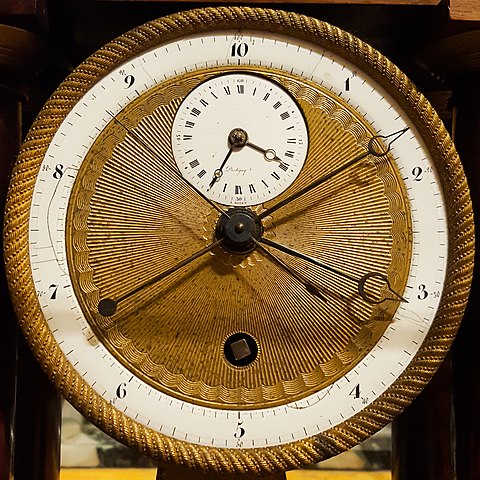
Why didn’t French decimal time last? It was too hard to alter the way people already told the time to introduce a system of decimal time and too expensive to remake all the clocks.
France began to use decimal time on 5th October 1793, just after the French Revolution. The point of the revolution wasn’t just to overthrow the monarchy and the aristocracy, but to overthrow the old system and usher in a new, brighter system. One of the things they brought in was decimalization. Just like the rest of Europe, most measurements used in France were based on old Roman systems that had evolved over the centuries. Systems like this made it difficult to trade and they made it difficult to collect tax because different towns might have different versions of the same measurements. A lot of European countries passed laws to standardize their measurements, but they were still all pretty confusing to work out.
From about 1750, France was taken up by newly discovered scientific principles. The Industrial Revolution was happening in England and the way that scientists thought, worked, shared information, and were viewed by society was changing. New scientific methods were being developed and a metric system lent itself more strongly to science. Shortly after the French Revolution, the meter, the liter, the kilogram, and all of their subdivisions were invented in France and made law. The French also changed their money to a decimal system, something which would take many other countries a long time to do. Then, thanks to Napoleon, this decimal system was spread over large parts of Europe. It took people a while to get used to the new systems, but they were easier to use, and it made trade a lot easier. There were far more advantages to the metric system than the than the previous system, so they ended up taking off. The French also decided to decimalize time as well, but that didn’t fare as well.
By time, I mean hours, minutes, seconds, of course, but also days. They didn’t make a year 10 months, but they might have done if the system had continued. The first step was introducing a ten-day week, and this was started on 22nd September 1722, the first day of the new French Republic. The leaders wanted to break with the old religious traditions as well and they felt that a seven-day week with a holy day on Sunday was too heavily linked to old France. They decided to break a month into thirty days and have three weeks of ten days each. Of course, 30 times 12 is only 360, so they had five days (six in a leap year) that they hadn’t accounted for, and they decided those would be holidays. People weren’t happy about having to work nine days before they had a day off, so they decided to have a holiday in the middle of the ten-day week as well.
The idea of breaking the day into decimal units had been brought up in 1754 and again in 1788. No one had taken it on, but after the revolution, it appealed to the desire to decimalize everything and on 5th October 1793, it was brought into law. The day was divided up into 10 hours. Each hour was 100 minutes and there were 100 seconds in a minute. I’m writing this at 16:13 on a Sunday afternoon, which makes it 6:76:83 (hours:minutes:seconds). The decimal system made calculating time much easier and there is no reason why time shouldn’t be metric. The only reason we use multiples of 60 is because of the base 60 system that the Babylonians use. Time is all arbitrary, so we can use whatever measurements we want.
The system lasted 17 months and the law was repealed on 7th April 1795. So, why didn’t French decimal time last? There were several problems. The first problem is that nobody really needs to calculate time. The only people who a decimal time system would be better for are scientists who are trying to measure and analyze things. A decimal system would make their calculations easier. Regular people only really need to know what time it is and roughly how long to or from a previous point. The second reason is that all of the clocks in the country would need to be remade and all new clocks would need to be recalibrated so they could count 100 seconds and 100 minutes and 10 hours. That was a very expensive problem. The third reason was that people were used to 60-minute hours and 24 hours a day. It is difficult to learn a new system. The introduction of other metric systems had shown that it is possible for people to adopt new systems, but there was no real advantage to the regular person to having a metric time system. And that’s why it didn’t take off. And that’s what I learned today.
Image By DeFacto – Own work, CC BY-SA 4.0, https://commons.wikimedia.org/w/index.php?curid=64816687
Sources
https://svalbard.watch/pages/about_decimal_time.html
https://en.wikipedia.org/wiki/Decimal_time
https://www.engadget.com/that-time-france-tried-to-make-decimal-time-a-thing-143600302.html
https://en.wikipedia.org/wiki/History_of_the_metric_system
https://www.quora.com/Why-wasnt-the-French-decimal-clock-accepted-as-the-standard-unit-of-time
